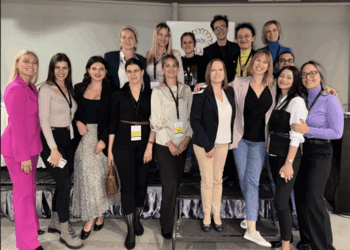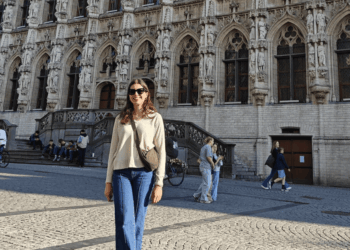EACR-Worldwide Cancer Research Travel Fellowships provide funds up to €3,000 to early-career cancer researchers. For more information on how to apply for Travel Fellowships, you can visit the EACR website.
Name: Lydia Dyck, Postdoctoral researcher
Home Institution: Trinity College Dublin, Ireland
Host Institution: Harvard Medical School, USA
Dates of visit: 02 July – 23 August 2018
Research: Obesity is a global health problem and over two thirds of the world’s population are overweight or obese. It is well known that obesity can lead to type 2 diabetes, heart disease and hypertension. However, there is more and more evidence that obese people also have a higher risk of getting cancer and respond less to vaccines. With my current research, I’m trying to understand how obesity changes the immune system which is important for vaccinations, the prevention of cancer and successful cancer therapy. This knowledge can help to design better therapies for the treatment of cancer.

How did you hear about EACR Travel Fellowships?
I met Roger Doxat-Pratt, the EACR Conference and Fellowships Officer, at the Irish Association for Cancer Research annual meeting in 2017 and he told me about the work of the EACR and the fantastic travel fellowship program. He encouraged me to apply in case I planned to go abroad for a project, which I did a year later. Thanks to Roger for the advice, this fellowship allowed me to work in Harvard for two months which has been a very valuable experience.
Why did you choose the host lab?
I have spent two months in the laboratory of Prof. Ulrich von Andrian in Harvard Medical School. My research focuses on immune cells in the tumour microenvironment and I have been very interested in imaging the interaction between immune cells and tumour cells. Intra-vital microscopy is a technique by which tumours can be analysed in living animals and it allows the recording of the migration and extravasation of immune cells in real-time. Prof. Ulrich von Andrian is a world expert in intravital imaging and has made major discoveries in the field of immunology, such as the 2-step model of leukocyte-endothelial adhesion. Members of his lab have established imaging protocols for a variety of tissues and disease models, including the imaging of tumours. Therefore, the host lab was the ideal environment for me to learn a new technique from world experts.

Can you summarise the research you did or what you learned on your visit?
I visited the von Andrian lab in Harvard Medical School to learn how to perform multiphoton microscopy and intravital imaging on mice. The goal was to use these techniques to study immune cell infiltration in obesity and the interaction between tumour and immune cells. I learned how to prepare samples for multiphoton microscopy and analysed the infiltration of immune cells in different tissues. This technique allowed me to take 3D images of immune cells and blood vessels in tissues. In addition, I learned how to perform surgery on mice to implant mouse dorsal chambers. This enabled me to image immune cell migration and tumour infiltration in real-time.
Did you take part in any interesting cultural activities?
The summer in Boston has been incredible and I spent every free minute exploring the city. I visited the science museum and the museum of fine arts, walked the freedom trail and went whale watching. Not only this, I visited outdoor movies, participated in Paint Nite, and visited the Harvard campus in Cambridge. I also really enjoyed watching the fireworks on the 4th of July from the river Charles listening to the Boston Pops Orchestra. The absolute highlight of my trip was watching a Red Sox match in Fenway Park. The atmosphere in the stadium was fantastic and after watching the match I truly became a Baseball fan (Go Red Sox!).
Did you have a personal mentor or anyone who particularly helped you?

Two postdocs in the von Andrian lab have been particularly helpful during my time in Harvard, Dr. Rodrigo Gonzalez and Dr. Munir Mosaheb. Rodrigo is an imaging expert and he taught me everything there is to know about multiphoton microscopy, particularly how much patience you need to learn this technique. Munir is an expert in intravital imaging of tumours and a cancer immunology enthusiast like me. He taught me how to perform surgery on mice and implant dorsal chambers to image tumours and blood vessels in living animals. The highlight of my time in the lab was watching immune cells travel through blood vessels in real-time. Apart from the lab work, I particularly enjoyed the cultural exchange with scientists from all over the world.
Have you brought back any specific knowledge/technique that has benefited your home lab?
I had the unique opportunity to learn multi-photon microscopy and intravital imaging in Harvard. In my home institute, there is a multiphoton microscope which has never been used for intravital imaging. I am planning to set-up this new technique in my home institute and train other researchers. Intra-vital imaging requires a lot of experience and expertise, and I am fortunate that my host lab agreed to stay connected and help me with trouble-shooting and advice. I am also looking forward to potential collaborations in the future.
How has this visit been beneficial to your research and/or your career?
This visit promises to be very beneficial to my research and to my career. With the skills I learned, I can set-up a new technique in my institute which will accelerate the impact of future publications. I made new contacts in other labs in Harvard, which will be beneficial for future scientific exchange and collaborations. Moreover, gaining invaluable experience in a prestigious institution like Harvard Medical School will undoubtedly enhance my future prospects in research.







